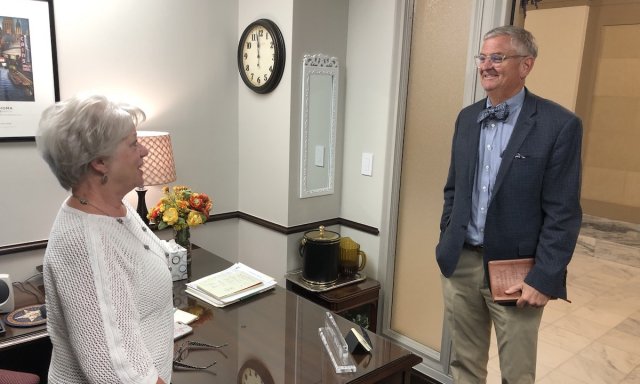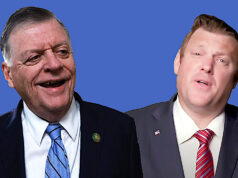
When former Bartlesville Sen. Jim Dunlap speaks to groups around the state, he usually asks the crowd a question: How many of you have a lobbyist at the State Capitol?
“About half the hands will go up. I say, ‘Every hand in here should go up.’ Because if you own a car or if you pay insurance on the car, you have a lobbyist at the Capitol working for you,” Dunlap said. “Do you go to a doctor? Well, doctors have lobbyists.”
Within health care alone, different groups of doctors have different lobbyists. Patient groups — such as the American Cancer Society and the American Heart Association — also have lobbyists, as do other industry professions and their employers.
“We as lobbyists represent a lot of people,” Dunlap said.
A 12-year veteran of the contract lobbying world, Dunlap is a driving force behind the creation of a new trade group for his profession launched this summer: The Oklahoma Society of Professional Advocates.
Joined by board members H.J. Reed (Phillips 66), Jill Daugherty (Chickasaw Nation), Robbie Squires (Cox Communications) and Michael Kelsey (Oklahoma Cattleman’s Association), Dunlap has invited all 400-plus registered lobbyists in Oklahoma to join, but he said the association is hoping to feature about 100 total members.
“One of the main issues in our industry is that a lot of us are independent contractors, and we don’t have a real office and we don’t have the option to go for health care benefits,” Dunlap said.
Beyond finding a vendor for health insurance, another goal of the association will be to formalize a code of conduct, which Dunlap said is already drafted and awaiting consideration once membership for the upcoming year is more finalized.
Additionally, Dunlap said the association will attempt to help lobbyists get to know one another better in an effort to avoid personal turmoil during session. One place many will find common ground is through observing the Oklahoma Ethics Commission‘s annual rule-making process.
“When they bring up these ethics rules and change them, we want to make sure everybody knows what is going on, and if there is a response that you in the media need to know, then this association ought to be able to give you a response about what our collective opinion is,” Dunlap said.
In addition to representing his own clients, Dunlap co-owns the firm Majority Plus with Pat Hall, a former director of the Oklahoma Public Employees Association.
Association goals ‘up to the members to determine’
While Oklahoma Society of Professional Advocates members have their own autonomous jobs, the group has hired a part-time executive director to spearhead administrative duties: Denise Northrup.
“I think term limits has even increased the value of lobbyists because they have much more institutional knowledge than many legislators at this point,” said Northrup, a longtime employee of and confidant to former Gov. Mary Fallin. “They know the history.”
Northrup, who also has an unrelated new job as development director for the Ivan Carter Wildlife Conservation Alliance, said many states — including Texas — have similar groups for lobbyists. Northrup said she views the Society of Professional Advocates the “same way” as any other profession that forms a trade association.
“I think there’s value of joining together as one profession just like the dentists, the doctors or the truck drivers. I think there is value in getting together and advocating about your profession as a group,” Northrup said. “What form that takes is dependent upon the direction that the board and the members decide. I don’t think we’ve gone into this with a preconceived notion of what that looks like. It’s up to the members to determine as they move forward.”
One initial member, James McSpadden of McSpadden, Milner & Robinson, said he applauds the group’s creation.
“I believe having a forum to collectively discuss the issues facing our industry will not only benefit those in the profession but the clients that we serve, as well,” McSpadden said.
Legislative service ‘like going to college and majoring in every degree’
Neither McSpadden, Northrup nor Dunlap is under any illusion about the public reputation of lobbyists, which might fall somewhere between cockroaches and Congress if polled for favorability.
“‘Lobbyists’ are a name that is punted around a lot out here at the Capitol that we are all bad and evil people in dark rooms with dinners and that we do all this spending on legislators,” Dunlap said. “Well, come out here and visit the Capitol for a day and watch what a legislator goes through.”
Oklahoma Ethics
Commission (search)
Dunlap went “through” that routine for 16 years from 1989 through 2004, arriving at the Capitol before 7 a.m. so he could read the newspaper and catch up on constituent correspondence.
“By 9 a.m., you’re heading to committee rooms, and then you’re coming back to your office to get your next committee papers or whatever. Constituents are coming in and out, then you’ve got lobbyists and media wanting to talk,” Dunlap said. “By the end of the day, a legislator hasn’t had enough time to even delve into the issues. So those who come in from out of town can either go home to their apartment and sit there all evening, or they will go out to dinner with lobbyists. And I can promise you after the first two weeks, you’re tired of it. You’re tired of going to all these dinners and stuff. You just want to go home and see your family.”
Dunlap said a lobbyist’s main job is to “educate” people about complicated subjects, dozens of which are placed before each legislator every year.
“My background was as a general contractor in Bartlesville. We built houses. I could dig footings, pour concrete, frame houses, trim houses, things like that,” Dunlap said. “I came down here and I had to decide whether [optometrists] can stick a needle in my eye. How in the heck am I going to know what I’m voting on?”
Dunlap said he learned a great deal from sharing a seat with state Rep. Frank Lucas, who is now a U.S. congressman. Lucas taught Dunlap about agriculture, and Dunlap has spent more than a decade after leaving office trying to teach subsequent lawmakers about issues such as medicine, telecommunications and oil and gas. While Dunlap could be pigeonholed as a corporate hired gun, he also represents The Innocence Project and Everytown for Gun Safety.
The breadth of the interests Dunlap represents underscores a comment made to him by his own successor in the Oklahoma State Senate, John Ford.
“He said, ‘Man, this is like going to college and majoring in every degree they have to offer,'” Dunlap recalled. “Because that’s what you do.”
Northrup agreed.
“It’s impossible for anybody in the governor’s office or any member of the Legislature to know everything about a subject, and lobbyists often times expedite the learning curve by bringing background about an issue,” she said.
Dunlap said the public often assumes that lobbyists are out to “buy” votes through campaign contributions or dinners and drinks.
“The general perception is that lobbyists can buy votes. But if I can buy somebody’s vote, I want them out of here,” Dunlap said. “They’re the worst thing because someone can out-bid me no matter what. And if there are guys down here who try to use the system to do that, they’ll be gone. They just aren’t effective. For the most part, 99 percent of the people who walk into this building after they get elected do it for the right reason.”
Dunlap said that the Legislature’s “bad apples” draw much of the media attention, but he said most of the people who serve or work at the Capitol truly want to do well for the state. Believe it or not, Dunlap said, few lobbyists lie to lawmakers.
“This building is built off of trust. If we lie to a legislator, we are dead. We are absolutely dead because that legislator will say, ‘Never let that person back in my office,'” Dunlap said. “They’ll go in their caucus and say, ‘So and so lied to me on this bill, and here is exactly what he or she did.’ Then we’re done. Our clients will get rid of us, and our careers are over.”
Dunlap said the new association for Oklahoma lobbyists is planning to have an event during the 2020 legislative session, but he emphasized that legislators would not be invited.
“We are going to invite the staff because the [legislative assistants] and the [executive assistants] and the committee staff have to put up with us, too,” Dunlap said. “We need to know them and say thank you.”
(Editor’s note: McSpadden, Milner and Robinson has purchased advertising on NonDoc in 2019. This article was updated at 12:00 p.m. Wednesday, Sept. 18, to correct reference to H.J. Reed’s employer.)





















